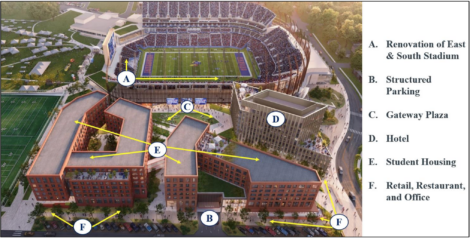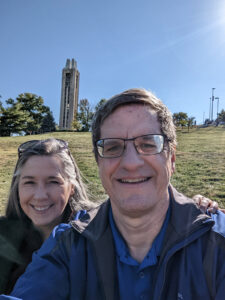Board of Regents moving ahead with possible tightening of tenure system for professors
First vote on the proposal could occur at December meeting

photo by: Shawn Valverde/Special to the Journal-World
The University of Kansas campus is pictured in this aerial photo from September 2023.
Kansas may become one of the tougher states for university professors to maintain their tenure status, if an idea to tighten the state’s tenure policy is implemented, the Kansas Board of Regents was told Wednesday.
“If the proposed changes were implemented, this would be one of the most robust processes in the country,” University of Kansas Chancellor Douglas Girod told the Regents.
Tenure is an academic rank conferred upon faculty members who meet a certain level of scholarship. The rank of a tenured professor has long come with a lot of job protection. Generally, it is difficult to fire a tenured professor unless an extensive process is undertaken. The tenure rank also has served as an effective shield against getting fired for saying something unpopular, which can be a danger for an academic who feels the need to test boundaries in order to expand them.
The topic of tenure has become a hot political topic in many states as higher education systems have faced greater scrutiny. Academic leaders in Kansas and elsewhere have said changes to the tenure system must be very thoughtful because anything that would weaken tenure protections or make the rank extremely difficult to obtain or keep would negatively impact the ability of the state’s universities to attract top professors.
During Wednesday’s meeting, which was held via Zoom, Girod did not state whether he thought the proposed changes would create those type of recruitment and retention challenges. However, the changes being discussed by Regents would be significant on several fronts. They include:
• Professors who have received tenure would be required to undergo an extensive review by a committee every five years, instead of the current standard of every seven years.
• Universities would be required to create a much more detailed annual work plan for professors that spells out how many hours of teaching versus research the position would be expected to undertake. The proposals generally states professors at research based universities should spend 40% to 55% of their time teaching classes. KU’s current policy generally sets 40% as a target, but also includes a process where researchers and others can have that teaching requirement significantly reduced.
• The proposal would create a new policy for all the state’s public universities that says any faculty member who receives an “unsatisfactory” annual evaluation must be put on on a one-year improvement plan. The proposal also states: “two consecutive failures result in dismissal.” Currently, there is not a statewide policy to that effect, but rather each university is allowed to create its own policies or practices on how to deal with unsatisfactory reviews.
How tough the review process might be likely would be determined by a key definition that hasn’t yet been created. Regent Pamela Ammar said that various proposals have talked about how tenure faculty can only be terminated for “adequate cause,” but that the Regents have never come up with a definition for that phrase.
“That’s kind of vague, to the say the least,” Ammar, who is an attorney by training, said of the phrase.
Ammar suggested that the board direct its legal counsel to research and create a proposed definition for the term. Board members, however, did not take any specific action on the tenure proposal. Rather, the item on Wednesday’s agenda was only for general discussion. A specific proposal for the Regents to consider is expected to be on the board’s December agenda. It would receive a first reading and vote and that meeting, and presumably would be up for final approval at the board’s January meeting.
That would result in a new tenure policy being approved just as the Kansas Legislature begins its new session. Board members created a goal of reviewing the state’s tenure policy, in part, because several legislators had indicated they would attempt to change the tenure policy if Regents didn’t.
At Wednesday’s meeting Girod — who is nationally active in the higher education industry as the chair of the Association of American Universities — said it was important to recognize that Kansas is not currently a laggard in the area of monitoring its tenure system. He said many states do not have a process as rigorous as Kansas’ for reviewing the work of professors once they have been granted tenure.
“Most of what you are seeing in state legislatures around the country are trying to accomplish where we are today in terms of post-tenure review,” Girod said.
Regents Chair Blake Benson said the board’s approval process will involve soliciting input from the various faculty senates that exist at each of the state’s public universities. That review process has begun at most of those universities, Regents were told, but the Council of Faculty Senate Presidents — which is comprised of the faculty senate presidents of each university — hasn’t yet taken a position on the changes, Regents were told in a report on Wednesday.
In other business, Regents approved:
• An ownership transfer from KU to the KU Endowment Association of approximately five acres of land just east of KU’s football stadium. As the Journal-World reported, the transfer is part of the process to build the Gateway District — including a privately-operated hotel and student housing — near the stadium. The ownership transfer will allow KU Endowment to create a commercial lease for the future operator of the hotel and student housing properties. The ownership change also will make the property subject to property taxes, which is generally not the case for any property owned by the university.
• A new union contract for about 290 maintenance workers at KU’s Lawrence and Edwards campuses. The contract sets new minimum pay ranges for the maintenance workers, based upon rates that their area counterparts are receiving in the private sector. The contract commits to bringing all maintenance workers up to the minimum level of the pay range. Workers who already are making the minimum level of the pay range will receive a 4% wage increase.
• The architectural program statement for the east grandstand renovations of David Booth Kansas Memorial Stadium. The basic statement puts a project cost of $177 million on the work, which will involve demolishing the existing grandstands and building new seating similar to what is on the west side and north end of the stadium. As the Journal-World reported, demolition work would begin in mid-December. A portion of the seating would be open for the 2026 football season, with the remainder of the seating open for the 2027 season.
• KU’s creation of an “affiliated housing plan” that will allow the university to advertise and promote privately-owned apartment complexes, if they meet certain standards established by the university. A KU official told the Regents the plan was necessary for KU to fully work with the private developer of the student housing complex proposed for the Gateway District, but he said the affiliation program could also include other Lawrence properties.





